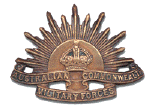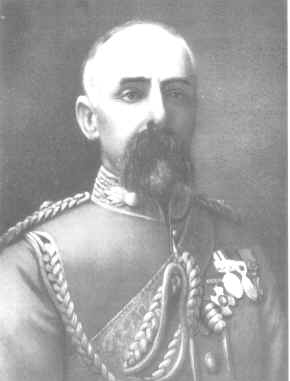|

|
| Category: Assorted/Heroes |

|
|
|
|
|
|
Henry Parke AIREY CMG,
Australia's 1st DSO |
 |
After returning with the New South Wales Contingent to Sudan, H. P. Airey volunteered as a special
service officer with a British expedition to Burma in 1886, becoming the only member of any Australian
colonial forces to be present there.
His part in an action against Dacoits resulted in his receiving the
Distinguished Service Order a new award instituted in that year so that he was almost certainly the
first Australian ever to receive it.
He later served in South Africa, before retiring with the rank of
Colonel. (C. N. Robinson, Celebrities of the Army, London, 1900) |
AIREY, HENRY PARKE (1842-1911), was born on 3 August 1842 at Kingthorpe, Yorkshire, England, son of an Indian Army officer. Educated at Marlborough College and the East India Company's Military College at Addiscombe, he went to India on graduating in 1859, and was commissioned ensign in the 101st Regiment (Royal Bengal Fusiliers) in 1861. He served on the North-West Frontier for six years and was promoted lieutenant in 1863.
Airey retired from the army in 1866 and arrived in Sydney in August. By 1868 he had established himself as a sugar-planter at Cleveland, Queensland. He later bought a property at Georges Hall near Liverpool, and when a third battery was added to the colony's permanent artillery he obtained a lieutenancy in 1877.
In 1885 he accompanied the New South Wales contingent to the Sudan and served as aide-de-camp to General Sir Arthur Fremantle, governor of Suakin, during the advance on Tamai. On his return Airey applied for a captaincy with the New South Wales Field Battery, but his commanding officer, Lieut-Colonel W. Spalding, refused to recommend him because he
had "displayed a want of zeal and energy" in carrying out his duties as a field battery
officer on active service. A court of inquiry, convened in December 1885, exonerated Airey and he was promoted
Captain with effect from the previous March.
In 1886 he volunteered to accompany the Burma Expedition as a special-service officer and was attached to General Sir George White's staff. He was severely wounded, was awarded the Distinguished Service Order
for coolness under fire and marked gallantry'. and was thanked by the Viceroy of India. On returning to Sydney he resumed duty with the colony's field artillery forces. He was promoted
Major in June 1893 then spent several months training in India: he became
Lieut-colonel in August 1895, and was appointed honorary Aide-de-Camp to the governor in November 1896.
In February 1900 Airey left for South Africa in command of the New South Wales
Citizens 'Bushmen's Contingent which saw action in Rhodesia and the Transvaal. His force was present at
the relief of Mafeking and was ambushed by a strong Boer commando near the Magato Pass on 22 July. After eight hours of fighting, reinforcements arrived and the Boers were driven off; at one stage Airey had tried to surrender his whole force to the enemy by insisting that a white flag raised by one isolated party applied to the whole unit. From November he
commanded 'B' area of Cape Colony. He returned home in January 1902 with a reputation for being a 'dashing officer' and an 'intrepid and popular leader, and was appointed C.M.G. that year.
Airey retired, albeit reluctantly, on 1st September 1902 with the rank of honorary colonel. Soon after-wards he went to South Africa where he became a stock and grain farmer; he died at Panplaats, Transvaal, on 9 October 1911. Though always a controversial figure, Airey was undoubtedly a gallant and able soldier and, in spite of his domineering personality, was popular with the men he commanded. |
|